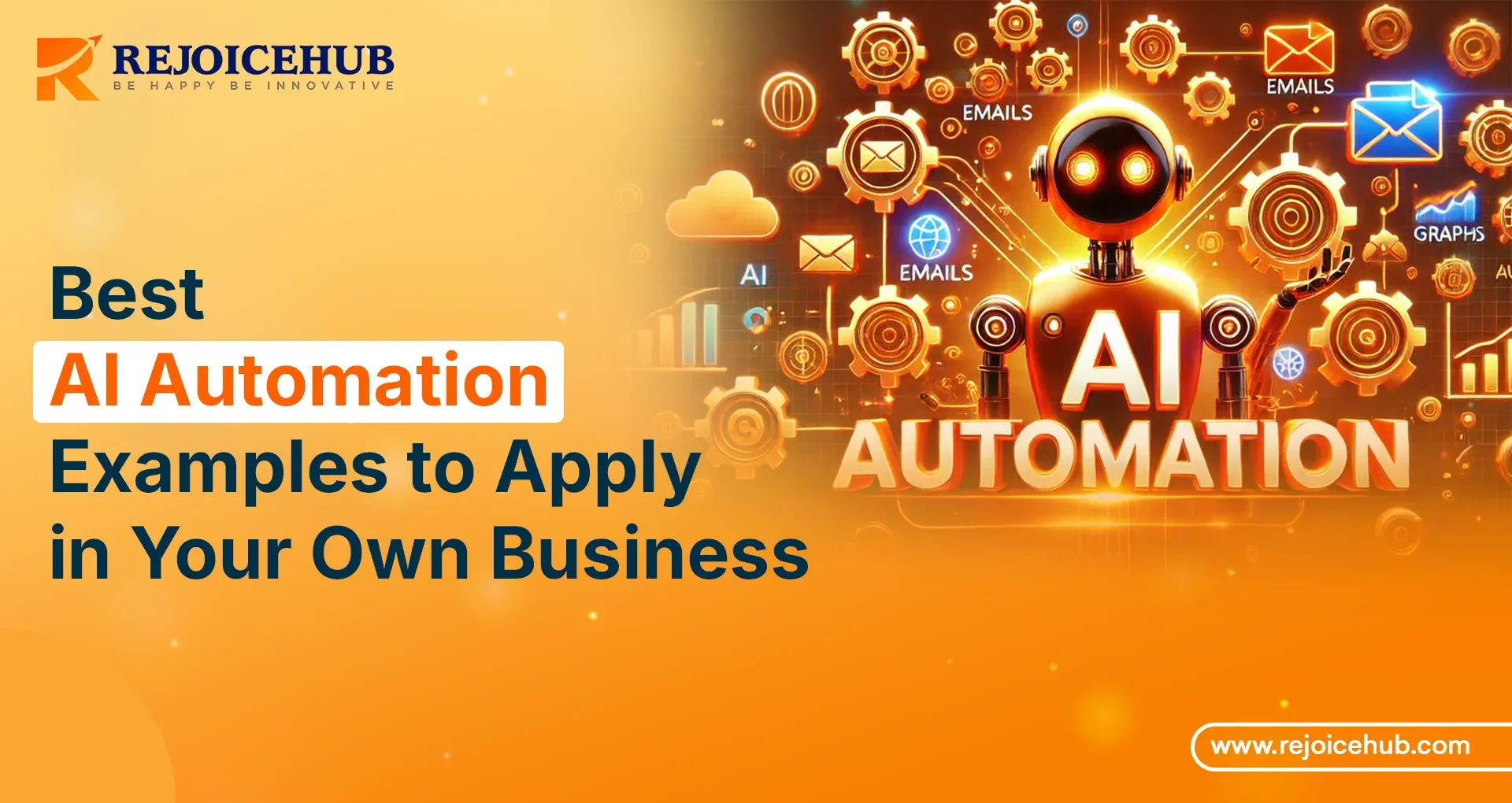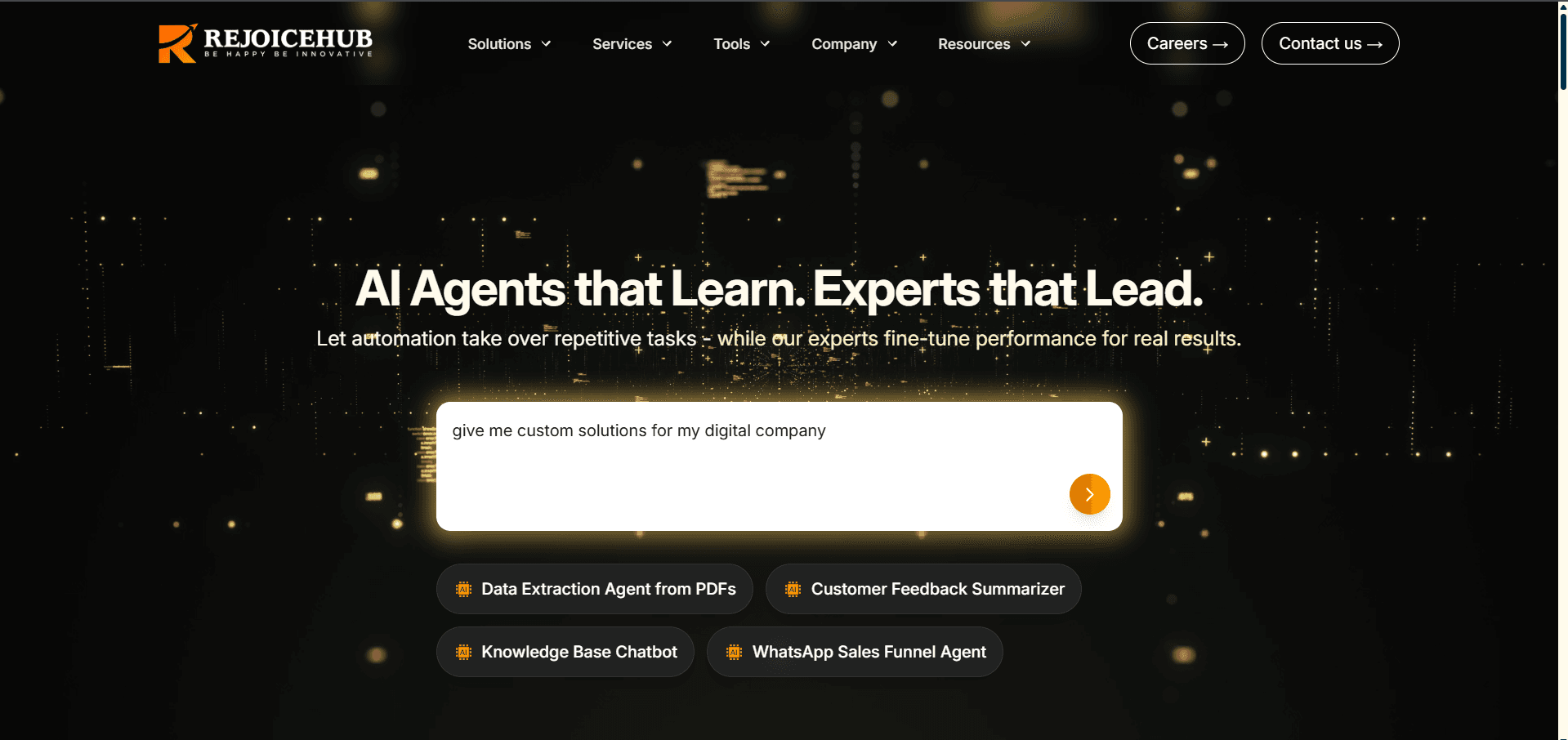
Over the years of working with AI tools, I have learned that when you automate a repetitive task for your clients, it not only saves a lot of time but also saves operational costs, giving them an opportunity to scale their business.
When AI models were evolving in 2023, I experimented with AI automation and wondered how an algorithm could handle complex processes in a few seconds, which humans have been doing such an important role in for decades. If we understand AI automation in 2025, then it has become so capable that it can make decisions autonomously, and it can easily handle complex operations, including financial fraud detection to health care records management.
In this article today, we will understand real-world AI automation examples, and along with it, we will also learn about the best AI tools and best practices that you can apply in your business, whatever industry you are in.
Quick Summary
AI automation combines with artificial intelligence to handle workflow automation, making it easier to perform repetitive and data-heavy tasks, and due to it requires minimal human intervention.
By 2025, AI automation will be used extensively in almost all industries, be it the energy sector or the education sector, to boost their workflow efficiency, cut operational costs, and improve the customer experience.
There are many firms and no-code platforms in the market that help businesses in AI automation, and the right AI automation partner is also very important because your ROI will depend on the quality of AI automation.
Our Focus in this article:
- What is AI automation, and how exactly does it work?
- What are the benefits of AI automation?
- AI automation can be used in various types of operations by businesses, and they may have to face various problems.
- Which is the best platform or company for AI automation, and how can it be made efficient using best practices?
What is AI Automation?
You can consider AI automation as the most efficient employee of your company, who never takes a coffee break, never gets tired and mostly completes tasks and processes he completes automatically in seconds.
If we understand AI automation from a technical perspective, then it works by merging a lot of high-end technologies; major AI automation agents use three technologies.
- Machine Learning (ML): They learn by analyzing patterns according to the user's interaction and make predictions according to the data.
- Natural Language Processing (NLP): Software cannot understand the language of humans; for this, AI models use Natural Language Processing to understand human input and the final answer is also converted into NLP by the AI model, so that humans can understand the result.
- Predictive Analytics: These are advanced AI models that predict future outcomes based on historical data. Real estate and share market trading AI agents are the best examples.
For example: I worked with a financial client last year to automate their loan approval process, in this we advanced the credit score understanding system so that it could check the CIBIL history of the user, after this we built a system to analyse bank transactions patterns so that the customer's purchasing and financial knowledge could be understood and all this without any human, AI agents automate the loan approval process in 2 minutes.
The benefits?
- Human errors are reduced by using AI automation.
- Companies are able to make faster decisions based on their previous decision data and analytics.
- AI automation services are consistent, and their process is also quite scalable.
- AI automation provides a personalized experience to the customer.
Best Examples of AI Automation in 2025
To better understand AI automation, let’s try to understand it through real-world AI automation examples.
1. Replacing Code-Heavy Workflows in the Energy Sector
In the energy industry, I have mostly seen outdated code-heavy workflows that slow down operations because manual processes take a lot of time to get human approval. The energy sector requires a lot of regular auditing, and even small changes require IT intervention.
There are many no-code companies like Flowforma that provide automation in the energy sector, which makes it possible to reduce the operational time of approval systems. AI automation makes many tasks possible.
- Records of assignments and projects are automatically maintained.
- All unified process changes happen in one place.
- AI automation provides faster compliance reporting.
Using AI automation, the energy sector has to rely less on IT for its operations, and this saves significant time.
2. Financial Services Innovation
AI automation is playing a very important role in financial services. In the financial sector, AI automation is mainly used in three ways.
-
For Automated Loan Processing
If you apply for a loan in any Fintech company, you will notice that they claim that the loan will be approved in just 2 minutes, Fintech companies are able to make these bold claims only due to AI automation, because they automatically judge the loan process on the basis of credit score and banking transactions whether the customer is eligible for the loan or not.
This makes the loan approval much faster; due to AI, the loan approval process remains 85% accurate.
-
For Automating Compliance Processes
Many AI automation platforms like FlowForma, its compliance module always ensures that it can maintain the operations of financial institutions securely. For this, it can manage real-time audits and e-signatures itself. And it manages the operations strictly without slowing down the operations.
-
For Fraud Detection
As we all know that cyber cybercrime has increased a lot, and every year cyber cybercrime increases at the rate of 15% and every year cyber fraud worth $10.5 trillion occurs annually in the whole world. This amount is more than the nominal GDP of 99% of the countries of the world, and AI automation agents are tackling this problem very well. Machine learning models can detect suspicious patterns (like unusual transactions or foreign logins) and try to prevent potential losses faster than the human team.
I have a colleague who uses an AI-powered fraud detection system for a mid-sized bank, and it can block 40% of suspicious transactions. This reduces unnecessary account freezes and improves customer security and experience.
3. Digitizing Healthcare
Hospitals and clinics have to struggle a lot to digitally save patient details, medical reports, which is quite challenging and time-consuming if it is entered manually; that is why the medical sector uses AI automation for different operations.
- AI automation can save patient medical records digitally quite easily.
- They are capable of handling operation notes easily.
- Communication is very important in the medical department; hence, it is very important to have a universal communication system. In this AI helps them to communicate.
I have deployed FlowForma’s AI Copilot several times for healthcare sectors, and AI automation can easily handle everything from patient onboarding to discharge papers. The medical sector is a very critical sector, so it is very important that medical staff spend most of their time on patient care rather than repetitive entry-related tasks.
Also Rad: What is AI Process Automation? Benefits, Use Cases & More
4. AI Automation for Smart Manufacturing Processes
In many metropolitan cities, companies and manufacturers face labour shortages, and this disrupts the supply chain. AI automation handles the manufacturing sector very smartly, such that the available workforce spends their time on critical tasks rather than basic tasks.
- AI automation can easily manage purchase orders.
- AI systems can track inventory in real-time.
- AI automation manages compliance very well without manual paperwork.
Due to AI automation in the manufacturing industry, 15% of raw material wastage is avoided because it predicts the exact production requirement in advance.
5. Accelerating New Developments & Research in Pharma & Life Sciences
Pharma companies cannot afford delays, especially when they are working on life-saving treatments. Large pharma brands use AI automation for several purposes.
- AI automation tries to detect and correct artwork errors (a leading cause of product recalls)
- AI automation is used for employee training, and mock-up training is also done very effectively in production management.
- AI automation makes the production and management of the pharma sector 60% faster. This helps medicines reach the patients on time.
6. Personalized Learning & Automated Grading for Educators
AI is not only used for businesses but also for education. AI systems make education accessible even in rural areas.
- AI automation can easily generate assignments.
- AI provides personalized learning which tries to fill the learning gaps in an individual way.
- AI customizes coursework according to the pace of the student.
AI automation is mostly used in the educational and content creation sectors. AI automation enhances the learning of students and works from assignments to exam preparation.
7. Optimizing Project Scheduling & Safety Monitoring in Construction
87% of construction projects face delays, and the biggest reason behind it is weak management or safety issues, but AI automation has a lot of benefits for the construction sector.
- AI automation efficiently allocates resources.
- It makes accurate predictions of project timelines.
- It analyzes live footage of the construction site to tackle risks.
I have a friend who is a builder, and he told me that using AI automation reduces accident rates by 25% and the project gets completed on time.
Best Practices for Implementing AI Automation in Your Business
If you want to implement AI automation for your business operations, let's learn about its best practices, which you can follow to streamline your business operations and processes.
1. Identify High-Impact Processes
To implement AI automation, first focus on repetitive tasks that consume most of your time, and after try to automate those operations with the help of AI, which will also improve your business ROI. AI automation can easily handle your invoice processing, compliance checks, or customer onboarding.
2. Overcome Common Adoption Challenges
Whenever you implement AI automation in your business, educate your employees about it so that they can handle it easily. Whenever you train AI agents, try to keep the training data clean and accurate. And always choose tools that integrate smoothly with your current systems.
3. Ensure Scalability & Integration
Choose platforms or firms for AI automation that can connect with your ERP, CRM, and other critical systems and help your business grow. I am having a great experience with RejoiceHub for AI automation of my business, and if you want, you can also deploy AI agents through them as per your business operations.
How RejoiceHub Helps Achieve Operational Excellence with AI Automation
The RejoiceHub firm helps businesses streamline their automation processes so they can boost their efficiency by using cutting-edge AI automation tools and AI Agents. RejoiceHub eliminates your manual repetitive tasks, so your team's focus is on growth and strategy, not on repetitive tasks.

Key Features
-
No-Code Automation: Using RejoiceHub, you can automatically build app processes without writing a single line of code, and you can also take custom software solutions for your complex operations from the RejoiceHub support team. This platform is quite famous for non-code support.
-
AI Agent: RejoiceHub works like a virtual assistant, and for this, it extracts and validates the available data and recommends actions accordingly.
-
AI Copilot: As we know, AI agents can convert natural language instructions into fully functional workflows. For this, you only need to have basic prompt-giving skills; you can build everything from an AI Chatbot to AI agents. The RejoiceHub support team can help you deploy the AI Agent in your business operations.
-
Automated Document Generation: RejoiceHub provides an automated document generation facility, using which you can instantly create contracts, reports, and proposals.
-
AI-Powered Form Automation: RejoiceHub provides smart forms which can be used to capture company users' data and validate it in real time.
-
Workflow Builder: The RejoiceHub platform is best for everyone, from beginners to professional users, because its overall interface is quite simple to us,e in which you can handle complex processes with a drag-and-drop interface. RejoiceHub also provides custom solutions for complex problems.
-
Real-Time Data & Visualization: RejoiceHub's AI deployment will give you dynamic dashboards where you can see actionable insights about your business on a real-time basis, helping you make smarter decisions. This platform can help you convert data into interactive dashboards using only textual data. RejoiceHub also provides very useful tools for data analysis.
I have personally used RejoiceHub for AI automation for a logistics company, using which they can automatically track their shipments. In the next two weeks, they improved their manual updates by 80%. And this has also increased their customer satisfaction significantly.
If you are not from a technical background, you can also take help from the RejoiceHub support team so that they can give you proper guidance according to your business operation.
Conclusion
AI automation is not just a future trend in 2025 but is becoming a necessity to survive in today’s competitive world. AI automation is being extensively used everywhere, whether you are in healthcare, finance, manufacturing, or the education sector. AI automation helps companies reduce their operational time, save costs and provide better services or products to their consumers.
If you want to implement AI automation for your business, then keep in mind to start with small repetitive tasks and try to make them efficient, and accordingly scale the automation for other operations as well. If you are a beginner, then you can prefer no-code platforms, and you can also use the RejoiceHub firm for automation implementation.
Frequently Asked Questions
1. How accurate is AI automation compared to manual work?
The overall results of AI automation are quite consistent, which means its accuracy is much better, and AI automation gives an approximate 95% success rate. And the accuracy of manual work is also much better if it is done by experienced staff.
2. Is AI automation expensive?
Custom AI automation is expensive, but if your budget is low, then you can use a non-code platform, due to which building AI agents is also cheap compared to traditional automation systems
3. Can AI automation work with my existing software?
Yes, most modern AI tools integrate with ERP, CRM, and other platforms. If your AI automation is custom, then for this, you can take help from your partner company for integration.
4. Will AI automation replace my employees?
Not necessarily, AI can easily handle repetitive tasks, freeing up human staff to spend time on strategic or creative work. AI automation will not eliminate jobs, but will change the role of jobs.
5. How do I start implementing AI automation?
First, you need to identify one or two repetitive processes, then choose a suitable AI tool, then use it for a pilot project, and measure the results before scaling.
6. How does AI automation benefit businesses?
It reduces manual errors of businesses, cuts their operational costs, and tries to increases productivity, and helps employees focus on high-value creative and strategic work.
7. Which industries use AI automation?
Although AI automation is used in many sectors, it is primarily used in sectors like manufacturing, finance, healthcare, marketing, and customer service, where there are a lot of repetitive tasks, and AI automation helps businesses in decision-making for their different operations.
8. What challenges do organizations face when implementing AI automation?
If your AI partner company is not experienced, you may face challenges such as poor data quality, integration difficulties with existing systems. Apart from this, if you do not have skilled AI professionals, you may also have to face delays or complications in AI implementation.
9. How can businesses overcome employee resistance to AI automation?
For this, it is very important to have transparent communication with the employees, and it is also required to give them AI skill training so that they can handle this AI deployment transition. Apart from this, you can guarantee them job security so that they can freely invest their creativity in your business
